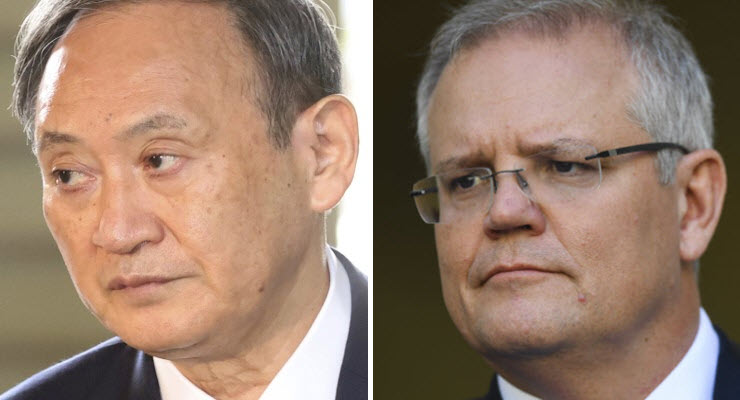
Scott Morrison is in Tokyo this week on a long-awaited visit delayed by bushfires and pandemics.
That Morrison picked Japan for his first official visit of the year is a clear sign of the government’s foreign policy intent, and how important that relationship is. But it’s also a visit which could give Australia plenty to learn.
Deepening ties
First things first: Morrison’s trip is a sign of just how seriously Australia takes its relationship with Japan. Morrison was the first world leader to call Japan’s new Prime Minister Yoshihide Suga when he took office in September and he’ll be the first to pay him a visit at the Kantei, the PM’s office and residence.
The relationship has always been close. Australia and Japan are major trading partners and our leaders have historically gotten on well — remember the bromance between Tony Abbott and Shinzo Abe?
But Japan and Australia have been forced into each other’s laps by structural trends happening around the world, says Australian National University Australia-Japan research centre director Dr Shiro Armstrong .
“As uncertainties have grown during the Trump period, with the retreat of the United States from international institutions, Australia and Japan have had to fill in the void,” he said.
Learning on China
Australia and Japan are also united by a complicated relationship with China. We both count China as a close trading partner, but recoil at Beijing’s aggressive foreign policy under Xi Jinping. Both try to walk a tightrope between China and the United States.
But right now, Japan is handling things better than Australia, despite the countries’ dark shared history and ongoing territorial disputes.
“Japan has done a better job than Australia of managing the China relationship while staying close to the US and not compromising on its principles, values and interests,” Armstrong said.
While Japan has managed, according to former ambassador John McCarthy, to remain “tough-minded but non-confrontational,” Australia has been, at times, ill-disciplined. For example, Morrison’s unilateral call for an investigation into China’s handling of COVID-19 pushed things toward rock bottom with Beijing. Constant anti-China diatribes from the backbench aren’t helping the cause.
Australia, Armstrong says, really could learn some lessons from Japan.
Defence talks
Given the uncertainty both Japan and Australia feel about their place in the world, it’s only natural defence will play a big part of this week’s visit.
Morrison and Suga are expected to sign a major defence pact, which comes after years of deepening military ties. The reciprocal access agreement, which has been under negotiation for six years, will simplify joint military activities between the two countries.
What’s currently holding that agreement back is the question of whether Australian troops serving in Japan can face the death penalty. If Morrison and Suga can, as anticipated, sign the agreement, expect it to be the big announcement from the visit.
Climate awkwardness
One of Suga’s first steps as prime minister was to commit Japan to net zero emissions by 2050. South Korea followed suit days later. Next to them, Australia looks increasingly stupid and backward.
That decision is also very concerning for Australia, because Japan is our biggest buyer of thermal coal and gas. We’re also their biggest energy supplier.
Armstrong says Japan’s commitment to a post-coal world can’t be ignored. Morrison’s response, on the eve of jetting off, was to flag the importance of Australian hydrogen exports. Still, Japan’s new position will only continue to put pressure on Australia in years to come.
Towards a multilateral world
We still don’t know exactly what a Joe Biden presidency will look like for the Asia-Pacific. But there’s a good chance it’ll be a departure from the Trump administration’s hostility to international cooperation and multilateral institutions.
On the weekend, Australia and Japan signed the Regional Comprehensive Economic Partnership, the biggest ever free trade deal. Japanese policymakers hope that it could drag Biden back into the free trade fold. Japan also played an important leadership role in pushing for a successor to the Trans-Pacific Partnership when Trump withdrew the US.
According to Armstrong, a renewed focus on multilateralism will be a big topic of conversation for the two leaders. Building on the momentum generated by the partnership, discussions about improving cooperation through bodies like APEC and the G20 could be on the table.








Crikey is committed to hosting lively discussions. Help us keep the conversation useful, interesting and welcoming. We aim to publish comments quickly in the interest of promoting robust conversation, but we’re a small team and we deploy filters to protect against legal risk. Occasionally your comment may be held up while we review, but we’re working as fast as we can to keep the conversation rolling.
The Crikey comment section is members-only content. Please subscribe to leave a comment.
The Crikey comment section is members-only content. Please login to leave a comment.